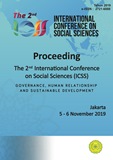IS FARMERS GROUPING A STRATEGY TO ACHIEVE WELFARE THROUGH AN INSTITUTIONAL PERSPECTIVE?
Abstract
One of the biggest problems of social welfare in Indonesia is poverty. The percentage of poverty in Indonesia is centered in rural areas with farmers as the poorest group. Ironically, farming is one of the biggest sector which absorbs labors in this country. To solve the problems of poverty among the farmers, the Indonesian government initiates a policy to build an institution for famers named Gapoktan-Gabungan Kelompok Tani (Farmers group). Through Gapoktan, farmers are expected to increase the scale of economic and business efficiency. The aim of this study is to analyze Gapoktan as an institution to implement social development approach with an institutional perspective. This study used a descriptive qualitative research approach with a purposive sampling technique. The informants consisted of the government agent, administrator and members of Gapoktan Mandiri Jaya, Cikarawang, Bogor. Data collection was conducted through documentary and literature search, observation, and in-depth interview. Data was analyzed with data sorting, data classifications, axial coding, selective coding and interpretation. Meanwhile, the validity test was performed by data triangulation. The results of this study shows that Gapoktan is an institution that can become a channel for social development with an institutional perspective because this institution is able to synergize social and economic policies and at the same time it brings a direct impact to the welfare of the community with a great access to the venture capital, the technology as tools, seeds, and fertilizer, also an access to the broader market. Keywords: Joint farmers group (Gapoktan), institutional perspective, social development, social welfare.Downloads
Published
2020-05-17
Issue
Section
Articles


